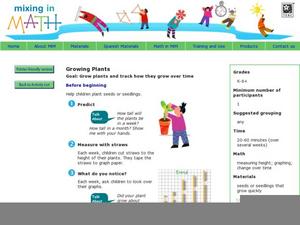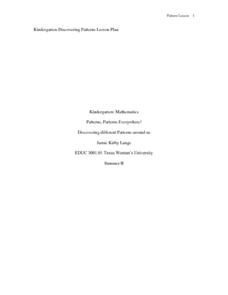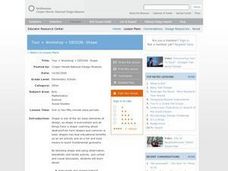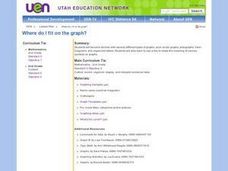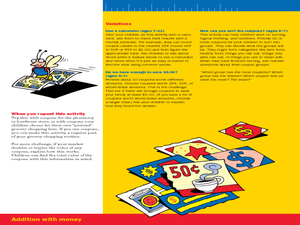Mixing In Math
Mixing in Math: Growing Plants
Whether you have your class plant seeds or begin when sprouts are visible, math skills are used here to predict and track growth over time. Straw bar graphs show plant height on a given day while the graph as a whole shows changes over...
Curated OER
Everyday Math
Students discuss word problems involving time and money. In this mathematics instructional activity, students solve word problems as a class focusing on addition, subtraction, multiplication, and simple fractions. Students then make...
Curated OER
Life Skill Communication
Students use digital camera to document the needs for daily living. In this life skills and visual arts lesson, students create class books that include photographs of everyday objects that they use in their home, school and...
Curated OER
My Foot and the Standard Foot
Young mathematicians put one foot in front of the other as they learn how to measure length in an elementary math lesson. Using paper cutouts of their own feet, children measure classroom objects as they discover the importance of...
Curated OER
Math Investigations
Students brainstorm how math is used in daily life. They develop a class list of different topic areas in which math is used and
work in small groups to think of specific examples of how math is an important part of their lives.
Curated OER
D.O.L.P.H.I.N. Binders
DOLPHIN—Daily Organizational Learning Portfolio and Handbook of Intelligent Note-taking. Here you'll find over 40 pages of templates, reference handouts, and instruction on ways pupils can organize their binders for a productive school...
Curated OER
Geometric Shapes: Shapes in Everyday Items
Which item is shaped like a cone? Use this multiple-choice shape recognition worksheet to give students access to shapes in their everyday life. Four questions ask scholars to identify which of the pictured items is shaped like a sphere,...
SEN Teacher
Clock Bingo
Telling time is an everyday occurrence, but with this resource, pupils can tell time and win! Print out customized bingo cards based on your learners' skill level by choosing different time intervals and number of cards per sheet. There...
Curated OER
Telling Time as an Everyday Use of Numbers
How can we estimate time? Have your young mathematicians make a clock. Then they compare and contrast types of clocks. They practice writing times in two different ways and make a book about telling time.
Illustrative Mathematics
Counting Overview
Develop automatic, meaningful counting skills with your class by using everyday classroom/school items, objects, and opportunities. Counting skills should be practiced during the year using objects and items they are familiar with and...
Texas Woman’s University
Patterns, Patterns Everywhere!
Not only is pattern recognition an essential skill for young children to develop, it's also a lot of fun to teach! Over the course of this lesson, class members participate in shared readings, perform small group...
Curated OER
"Reviewing Facts Through 10" Lesson Plan
Explore the joy of math with you little learners! They practice creating math problems with numbers from a fact family using numbers 1-10. They work independently with a set of connecting cubes to aid them in creating number sentences...
Baylor College
Need or Want?
Even as adults it can be hard to distinguish needs from wants. Using pictures of common, everyday items, children make a pocket chart separating the objects they need from those that they want. Discuss their choices, explaining that...
Curated OER
Design Patterns
Young scholars extend and create patterns. Through a variety of activities, they discover patterns as they exist in math and their everyday lives. Students create a necklace that represents a pattern.
Curated OER
Tour + Workshop = DESIGN: Shape
Ask elementary students to explore shapes in everyday objects. They will discuss the elements of design and describe the shapes they see in visual images. Students will then design and "build" a new 3D shape. Finally they will show and...
Curated OER
Can You Count on Cans?
How can a canned food drive be connected to math? It's as simple as counting and organizing the cans! Children demonstrate their ability to sort non-perishable foods into categories that include soup cans, vegetable cans, boxed items,...
Curated OER
Graphing It Daily
Students identify and demonstrate a positive learning attitude and use basic concepts and skills. Learners also communicate clearly in oral, artistic, written, and nonverbal form. Finally, students participate in the daily data...
Curated OER
Shapes in Our World
Help your students explore shapes. They classify shapes and identify them in their everyday world. Plane shapes are explored, and they classify and identify the plane shapes.
Curated OER
Category Puzzle
In this vocabulary and word study worksheet, students categorize 8 everyday words as they use the 8 clues to correctly complete the crossword puzzle.
Curated OER
Where Do I Fit on the Graph?
Students collect data and create graphs about themselves, their community, and the world around them. They use a variety of methods to organize data, such as stickers, clothespins, name tags, coloring, tally marks, etc.
Curated OER
Science: Let's Have a Cool Lunch
First graders develop problem-solving skills by designing methods for keeping lunch boxes cool. Once they determine the amount of sunlight and heat generated in shaded and unshaded areas, they explore ways to provide shade. Finally, 1st...
Curated OER
Reviewing Facts Through 10
Manipulatives are always fun for children to use. They use connecting cubes and blocks to solve addition and subtraction word problems with numbers up to 10. They then play a math game and use their cube to create number sentences....
Curated OER
Leaf Patterns
First graders explore the existence of patterns in everyday items. In this science and math integrated lesson, 1st graders match leaves with a name word card and organize them into four patterns. This lesson includes a reading of And the...
Curated OER
How Much Do We Save?
Students use coupons to save. In this saving lesson students practice their addition, multiplication and estimating skills with dollars and cents. They investigate grocery coupons and look for ways to save money.
